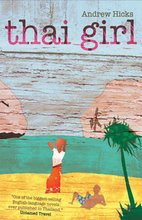What’s it all about, being an ‘expat’ and why do so many of us turn over a new leaf and open the expatriate page in our lives?
I guess I’m an expatriate as I live in Surin with Cat, though as I scribble this in my notebook, I’m gazing out at the mist and rain that’s been sweeping across the Tamar valley in the west of England ever since we arrived here six days ago. We’re staying with our old friends, Peter and Laylai who live most of the year just across the border from us in Si Saket, though when we visit England, we usually get away to see them if they’re in Cornwall. As Peter’s an expat too, he’s the only person who can truly understand me; other regular beings think me slightly deranged.
In Surin, especially in the dry season, I do sometimes miss England. I long for marmalade on brown toast and even the Sunday Times.
Even in Bangkok I cannot always restrain home thoughts from abroad, standing bent double on a noisy green mini-bus as it terrorizes Sukhumvit soi 71. “England, with all thy faults I love thee still.” Though now in England in early summer, I’m missing the passion of a tropical downpour as I watch the grey, depressing variety that’s dribbling endlessly down outside the window.
Slightly bored, I pull Peter’s battered Universal Dictionary of the English Language, thirteenth impression, 1960, off the shelf and aimlessly look up ‘expatriate’. Interestingly it’s not shown as a noun, so ‘an expatriate’, a rootless, beer-soaked drifter in baggy shorts, is a new usage, a product of globalization perhaps. But it lists the verb, ‘to expatriate’, meaning, ‘to drive out, banish a person from his (sic) native land.’ So we’re exiles who’ve been driven out and banished, are we?
There are, of course, many reasons we expatriate ourselves, be they world weariness, the weather, women and occasionally work. But while I’m not an ex-patriot and still love my country, I’ve voluntarily chosen to live in Thailand because I love it too. I love the constant stimulus of living in a different culture, the lure of the exotic and the fact that being a farang makes me a little exotic too. My pallid skin and proboscis nose at last are truly appreciated.
In England I only have to open my mouth and everyone knows my origins, but in Thailand I can be more myself. Here I’m a farang, a high status term with a tinge of abuse, though I’m categorised mainly by the state of my wallet. Am I unusually wealthy or merely rich? Generous, or mean as sticky shit? No, you can never escape being pigeon holed.
Thailand’s the second expat page in my life as ages ago I lived and worked in Nigeria, Hong Kong and Singapore. I can’t seem to kick the expat habit because I enjoy being slightly detached, being a spectator, a student of the society I find myself in. And in this it seems I’ve become a pro; my recent novel, “Thai Girl” is already a bestseller, credited, wrongly I’m sure, with special insight into the interaction between farang and Thais.
But it’s not all good and being an expat anywhere in the world involves constant compromise, irritations too. In Thailand I’m illiterate; I can neither read nor write. And however hard I work on my tones I might as well be deaf and dumb for all my linguistic efforts. Every other language has different words for ‘dog’ and ‘horse’ and ‘near’ and ‘far’, so why can’t the Thais? Is it to confound the foreigner?
And I’m not supposed to get cross when I’ve no idea what they’re all banging on about, keeping me in the dark. The boy in the bank can’t understand a thing I say, the taxi’s going half way round the world, and my order isn’t ready as promised; it’s broken and scratched, it’s the wrong size and the wrong colour. But never mind, mai pen rai, they tell me as they take my money. Laugh it off, hot head, don’t be jai rawn. And don’t raise your voice, you might upset us.
But it’s too bloody hot, the sweat’s gluing the shirt to my armpits, and worst of all, I can’t express my frustration. Sometimes it’s hard keeping the lid on.
Yes, there are frustrations in the expat life and we never hesitate to complain about them, especially to other expats. From Dubai to Delhi and Rio to Riyadh, we sit at the bar, whingeing into our beers. As you can’t complain to the locals, you need a safety valve, so we grumble to each other.
Back with Peter’s dictionary, the other word I was looking for was the verb, ‘to expatiate’. It’s got nothing to do with expats, but to my delight, although ‘expatriate’ and ‘expatiate’ come from different Latin roots, the meaning of ‘expatiate’ is curiously appropriate. ‘To expatiate’ means ‘to dwell at length, to speak at length upon’. Hence, to rant and ramble on, to bore the pants off. It’s exactly what we expats like doing, expatiating about everything that makes us mad.
And maybe that’s why I bore my friends when I visit England. They don’t listen when I tell them about Thaksin’s ‘rent a cow’ scheme, the million baht fund or the exotic buffet at the Chiang Mai Night Safari Park. So I drive down to Cornwall to see Peter and we sit in his window with a beer or two and look out at the Cornish mist. And though we’re at home, we expatiate our fill because that’s always an inescapable part of being an expat.
Thursday, 8 February 2007
Subscribe to:
Post Comments (Atom)





1 comment:
Expat woes - I also just learned that you shouldn't put your fork in your mouth, that it's used only to load your spoon with food and that it's akin to a Westerner putting a knife in their mouth while eating? I've been to a lot of Asian countries and fear I may have offended some along the way!
I only found your blog today, I have a lot of years to read yet and am enjoying it thoroughly.
Post a Comment